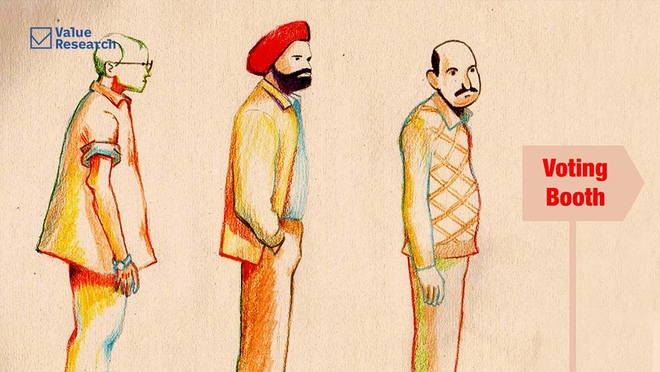
You would have read headlines stating that India's coming elections are crucial and the results are vital for its future.
This is true, but it's always been true. Ever since I became eligible to vote, I've seen nine general elections, which were exceptionally important and crucial for India's future. Each one changed India's future, for better or for worse.
Twenty years ago, when this magazine was not even two years old, we did a cover story titled 'Make your portfolio politics proof'. We were a very small team then, so I did the story with one or two colleagues. In that story, we laid down some ground rules for mutual fund investing that would make your investments relatively immune to political upheavals. Or so I thought at the time.
I was wrong, and the next 10 years showed that conclusively. Those years were a rollercoaster ride for the Indian economy and the stock markets. There was tremendous dysfunction in the political economy caused by a weak-willed yet rapacious alliance of convenience that held power.
It took many years for the worst effects to play out and the damage to become visible, but it eventually became too obvious to ignore.
As I look back on the past two decades, I realise that trying to make your portfolio completely politics-proof is a fool's errand. Politics and the economy are inextricably linked, and any attempt to separate them is bound to fail. Instead, the key is to focus on the long-term fundamentals and to invest in companies and sectors that have the potential to weather the storms of political uncertainty.
Moreover, the biggest lesson is that leadership matters. The decisions that leaders make and the diligence with which they execute those decisions decide the lives and livelihoods of millions of people. There is a trope in modern economic and historical studies that the fate of nations depends on 'structural' factors and that the people who lead nations do not matter.
This is rubbish. To see how, look at the comparative history of India, South Korea and China from about 1950 onwards. If structural issues were all that mattered, then India would have been far ahead of China and South Korea today. At that time, both countries were poorer than India. They were purely agrarian societies, unlike India, which had much better levels of internal industry, trade and transport and a robust business culture.
And yet here we are. Crores of Indians have been born, lived and died in needless poverty because of the direction in which the Indian economy was guided in the 50s, 60s and 70s. So, leadership and politics matter because politics is how leaders are elected. Still, it's crucial to remember that while leadership and politics greatly influence a nation's trajectory, the power of the people cannot be underestimated.
As citizens, we are responsible for staying informed, engaged and actively participating in the democratic process. Let's not fall into the foolish trap of 'being above politics'. Furthermore, as investors, we must remain vigilant and adaptable. While attempting to completely insulate our portfolios from political influences may be unrealistic, we can still make informed decisions based on a thorough understanding of the economic landscape, regulatory environmental and long-term market trends. By diversifying our investments, focusing on fundamentally strong companies and maintaining a long-term perspective, we can navigate the challenges posed by political uncertainties.
The upcoming elections are crucial for India's future, just as every election has been. As we witness the interplay of politics and economics, let us remember that the ultimate power to shape our nation's destiny lies with us - the citizens and the investors. By judiciously exercising our rights and responsibilities, we can contribute to building a more prosperous, equitable and resilient India.









